(牛津初中英语总复习)7BUnit4
牛津英语7B Unit4 Finding your way 语法讲解与测试(含答案)
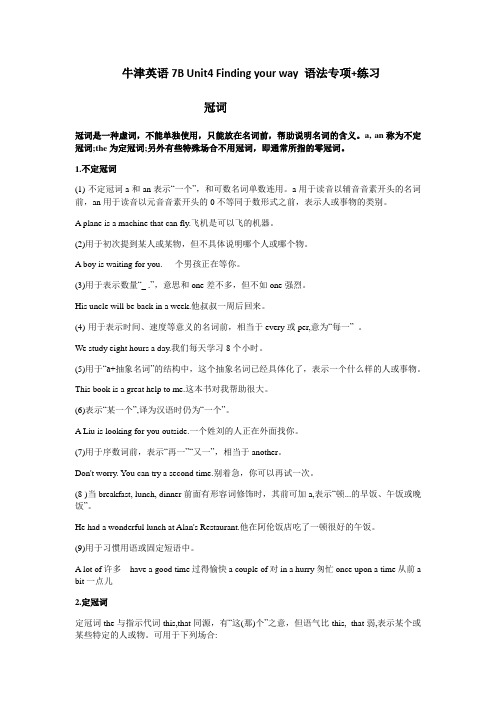
牛津英语7B Unit4 Finding your way 语法专项+练习冠词冠词是一种虚词,不能单独使用,只能放在名词前,帮助说明名词的含义。
a, an称为不定冠词;the为定冠词;另外有些特殊场合不用冠词,即通常所指的零冠词。
1.不定冠词(1)不定冠词a和an表示“一个”,和可数名词单数连用。
a用于读音以辅音音素开头的名词前,an用于读音以元音音素开头的0不等同于数形式之前,表示人或事物的类别。
A plane is a machine that can fly.飞机是可以飞的机器。
(2)用于初次提到某人或某物,但不具体说明哪个人或哪个物。
A boy is waiting for you.- - 个男孩正在等你。
(3)用于表示数量“_ .”,意思和one差不多,但不如one强烈。
His uncle will be back in a week.他叔叔一周后回来。
(4)用于表示时间、速度等意义的名词前,相当于every或per,意为“每一” 。
We study eight hours a day.我们每天学习8个小时。
(5)用于“a+抽象名词”的结构中,这个抽象名词已经具体化了,表示一个什么样的人或事物。
This book is a great help to me.这本书对我帮助很大。
(6)表示“某一个”,译为汉语时仍为“一个”。
A Liu is looking for you outside.一个姓刘的人正在外面找你。
(7)用于序数词前,表示“再一”“又一”,相当于another。
Don't worry. You can try a second time.别着急,你可以再试一次。
(8 )当breakfast, lunch, dinner前面有形容词修饰时,其前可加a,表示“顿...的早饭、午饭或晚饭”。
He had a wonderful lunch at Alan's Restaurant.他在阿伦饭店吃了一顿很好的午饭。
译林牛津版七年级英语下册7B unit4 知识点梳理

7B Unit4 <重点短语>1.have to 不得不,必须2.go straight on 一直往前走3.lie down all day long 整天躺着4.walk along 沿着...走5.turn left 向左转6.cross the bridge过桥7.walk past步行经过8.traffic lights 红绿灯9.plenty of大量,足够10.the way to 去...的路<重点句型>1.Sunshine Zoo is north of Sunshine Middle School.阳光动物园在阳光中学的北面。
2.--How will we get there?我们将怎样到那里?--We’ll get there by bus.我们将乘公共汽车到那里。
3.Go straight on, and you’ll find the Panda House.一直向前走,你们就会看到熊猫馆。
4.Remember that they are dangerous.记住它们很危险。
5.Birds make beautiful sounds when they sing.鸟儿在唱歌时会发出美妙的声音。
6.They jump around and make people laugh.它们上蹿下跳,惹得人们大笑。
7.Cross the bridge, and you will see the elephants.过了桥,你们会看到大象。
8.The food is above the drinks.食物在饮料的上方。
9.Walk past the house, turn left and walk along the path next to the river.走过这座房子,向左转,沿着河边的小路走。
10.The treasure is under the ground in front of the third tree on the left.宝藏在左边第三棵树前面的地下。
牛津英语 7B Unit4 短语词组

Welcome to the UnitUnit 4 Finding your way1. 跟我来/ 冬去春来。
1. follow me = come with me / Spring follows winter.2. 对某事有把握/ 对考试有把握 2. be sure of sth / be sure of the exam一定做某事/ 一定赢得比赛be sure to do sth / be sure to win the match 确信/我确信他会帮助我复习功课。
be sure (that)---/ I'm sure that he will help me with my lessons.3. 两山之间有条路。
3. There's a path between the hills. (paths)4. 别害怕。
4. Don't be afraid. / be afraid + 宾语从句恐怕…恐怕你的答案不对。
I'm afraid your answer is not right.害怕… /不敢做…be afraid of (doing) sth / be afraid to do sth我恐怕是这样。
/我恐怕不是这样。
I'm afraid so. / I'm afraid not.5. 不得不再上去/从这儿下 5. have to go up again / go down here不得不做某事/必须做某事have to do sth (客观需要)/ must do sth (主观看法)6. 认识去某地的路/认识回家的路 6. know the way to sp / know the way home指引某人如何到达某地show sb how to get to sp7. 在…北部/南部/东部/西部7. be north(south, east, west) of... = be to the north of…A在B的北边。
《牛津初中英语》7BUnit4AmazingthingsGrammar课件+教案grammardoc

《牛津初中英语》7BUnit4AmazingthingsGrammar 课件+教案grammardoc初中英语第一部分简要提示一、年级:七年级二、教学内容:7B Unit 4 Amazing things三、课型:Grammar四、教学目标1 知识目标了解并把握be动词和行为动词过去式的构成。
了解一样过去时的结构和用法。
2 能力目标依照情境正确使用一样过去时谈论过去的事件。
五、教学重难点:1 重点:了解并把握一样过去时的构成及用法。
2 难点:依照情境正确使用一样过去时谈论过去的事件。
第二部分教学流程Step 1 PresentationT:Hello, everyone! Today we’ll learn grammar of unit 4. How are you today?S: I’m fine.T:I’m fine today. But I was ill yesterday. Today I get a little better. So I can be here with you.Where are you now?S: We are at school now.T: We are at school now. But ten hours ago we were at home.T: Is it November this month?S: Yes!T: It is November this month. It was October last month.T: ten hours ago, last month .这些差不多上表示过去的时刻。
When we talk about the things in the past, we use the simple past tense. 当我们谈论过去的情况时,我们用一样过去时。
大伙儿是否观看到be 动词在过去时中的变化呢?Can you work out the rules?Task oneWorking out the rule1. am /is的过去式为;are 的过去式为。
牛津英语七年级下总复习题及答案(Unit 4-6, 7B)
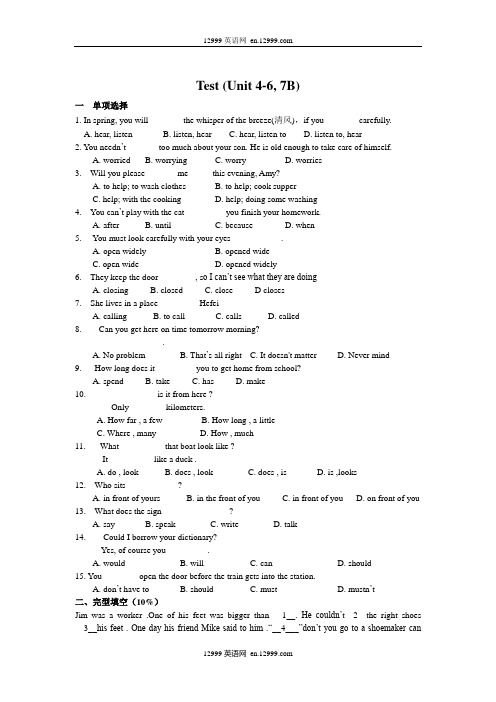
Test (Unit 4-6, 7B)一单项选择1. In spring, you will _______ the whisper of the breeze(清风),if you _______ carefully.A. hear, listenB. listen, hearC. hear, listen toD. listen to, hear2. You needn‟t _______too much about your son. He is old enough to take care of himself.A. worriedB. worryingC. worryD. worries3. Will you please _______me _____this evening, Amy?A. to help; to wash clothesB. to help; cook supperC. help; with the cookingD. help; doing some washing4. You can‟t play with the cat _________you finish your homework.A. afterB. untilC. becauseD. when5. You must look carefully with your eyes ___________.A. open widelyB. opened wideC. open wideD. opened widely6. They keep the door ________, s o I can‟t see what they are doingA. closingB. closedC. close D closes7. She lives in a place _________HefeiA. callingB. to callC. callsD. called8. ---Can you get here on time tomorrow morning?---______________.A. No problemB. That‟s all rightC. It doesn't matterD. Never mind9. How long does it _________you to get home from school?A. spendB. takeC. hasD. make10. -----___________is it from here ?-----Only ________kilometers.A. How far , a fewB. How long , a littleC. Where , manyD. How , much11.-----What __________that boat look like ?-----It __________like a duck .A. do , lookB. does , lookC. does , isD. is ,looks12. Who sits____________?A. in front of yoursB. in the front of youC. in front of youD. on front of you13. What does the sign _______________?A. sayB. speakC. writeD. talk14. ---Could I borrow your dictionary?---Yes, of course you _________.A. wouldB. willC. canD. should15. You ________open the door before the train gets into the station.A. don‟t have toB. shouldC. mustD. mustn‟t二、完型填空(10%)Jim was a worker .One of his feet was bigger than __1__. He couldn‟t _2__the right shoes __3__his feet . One day his friend Mike said to him .“__4___”don‟t you go to a shoemaker can__5___you the right shoes .”__6__Jim went to the shoemaker near Mike …s home . Very soon the shoemaker finished the work .Jim __7__the shoes and wasn‟t happy .He __8__the shoemaker .“ You aren‟t a __9__shoemaker! I wanted you to make me one shoe bigger than the other ,__10__you made me one shoe smaller than the other . ”1.A. other B. the other C. another D. that one2. A. see B. look for C. find D. find out3. A. for B. with C. on D. of4. A.When B. Where C. How D. Why5. A. make B. pass C. do D. give6. A. Then B. But C. So D. Because7. A. saw B. watched C. found D. looked at8. A. said B. said to C. spoke D. talked9. A. good B. bad C.right D. kind10 A. then B.and C. but D.so三、阅读理解(15%)(A)Students often want to practise their English outside class .One of the best ways of practicing your English is to speak to a foreigner .Most of the students ask , “Is it OK to talk to foreigners when we meet them in the street ?”The answer is yes and no , but probably no ! If you see a foreigner who looks lost , it is polite to ask him or her ,“ May I help you ?” But ,if not , you should probably let him or her get on with the business .That is , you can talk to a foreigner at some time or place .Feel free to ask him or her questions if a foreigner comes into your school ,classroom , or your teachers‟ office .It‟s also OK to talk to foreigners in some public places .If you see a foreigner alone in a restauran t ,a waiting room ,or a shop ,it may be the right time for you to ask him or her “Is this seat free ?” or questions like this .You can probably help them feel more welcomed .It‟s a pleasure to talk to a foreigner if you choose the right time and place .1.From these second paragraph(小节),you know that ___________.A.it is polite to stop foreigners to talk with you in the streetB.it isn‟t polite to stop foreigners when they are on business.C.it is polite to stop foreigners from talking with othersD. it isn‟t polite to help foreigners fi nd the way2.When you try to talk to a foreigner alone in a park , usually he may _________A. become angryB. keep quietC. go awayD. feel happy3. This passage perhaps comes from a newspaper in the ________column (栏目)A. sportsB. healthC. languageD. business4.The best title for this passage is _____________A. How to learn English in classB. Why to study English in classC. When to speak English outside classD. How to talk with a foreigner5. Where can we talk with a foreigner ?A. in a restaurant B . in a shop C. in the street D. it depends四. 单词拼写1.When we are in the library, everybody must keep _____________(安静).2.Look! The train is running __________(穿过) the tunnel!3.Don‟t _________(担心) about him. He feels better now.4. The world is so interesting. It is full of __________(令人惊奇的) things.5. When the little girl saw the big dog, she was ____________(害怕的).6. Do you know they ___________(打架) yesterday?7. It‟s too cold. I think I need another two _____________.(毯子)8. There is nothing in the box. It‟s ____________(空的).9. She often makes a lot of mistakes. She is not ____________(仔细的) at all.10. My pet rabbit has a short _________(尾巴).五. 选词填空从方框中选择恰当的词或短语并用其正确的形式填空。
牛津初中英语7BUnit4知识点归纳(K12教育文档)
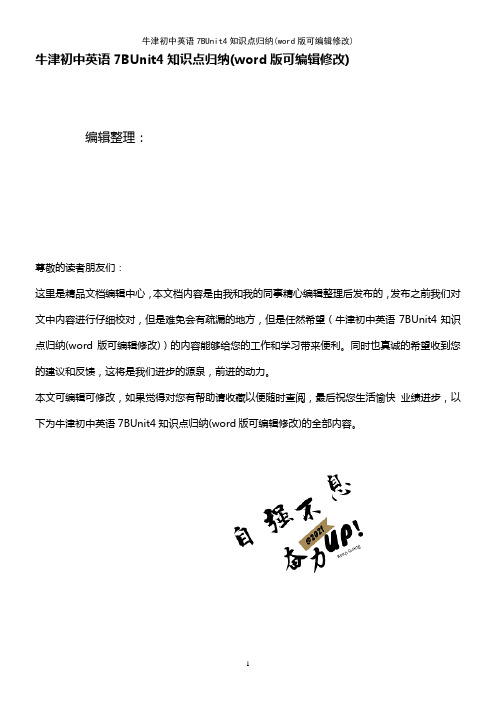
牛津初中英语7BUnit4知识点归纳(word版可编辑修改)编辑整理:尊敬的读者朋友们:这里是精品文档编辑中心,本文档内容是由我和我的同事精心编辑整理后发布的,发布之前我们对文中内容进行仔细校对,但是难免会有疏漏的地方,但是任然希望(牛津初中英语7BUnit4知识点归纳(word版可编辑修改))的内容能够给您的工作和学习带来便利。
同时也真诚的希望收到您的建议和反馈,这将是我们进步的源泉,前进的动力。
本文可编辑可修改,如果觉得对您有帮助请收藏以便随时查阅,最后祝您生活愉快业绩进步,以下为牛津初中英语7BUnit4知识点归纳(word版可编辑修改)的全部内容。
牛津初中英语7BUnit4知识点归纳重点短语及句型1.amazing things 令人惊奇的事物 be full of = be filled with 充满、装满2.bright light 明亮的灯 learn about some amazing things 学习一些令人惊奇的东西3.the bright light on the plane飞机上明亮的灯4。
come on 得啦、得了吧、过来/加油5。
be full of amazing things 充满令人惊奇的事物6.It takes( sb)some time to do sth 花费(某人)一段时间做某事It takes about three days to travel from Earth to the moon by rocket乘火箭从地球到月亮旅行花费大约三天7。
2。
72 metres tall/long/wide/deep. 2.72米高/长/宽/深How tall / long / wide / deep…?8。
at the same time 同时9.Fish sleep with their eyes open 。
鱼是睁着眼睛睡觉的10。
Elephants walk on tiptoe. 大象踮起脚趾走路walk on tiptoe / walk on foot 用脚趾走 / 步行11.There is no plant life without lightning =If there is no lightning ,there is no plant life 。
牛津英语7B(Unit4-6)复习课件
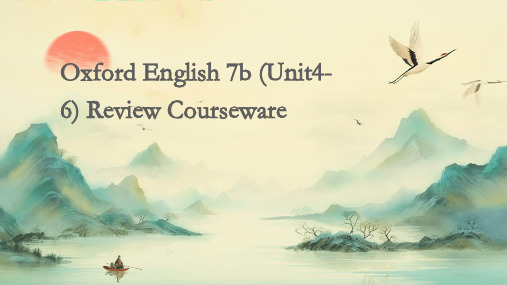
03
Unit 5 Review
vocabulary review
01
Vocabulary List
02
List of important words and phrases from the unit, including meanings and examples.
03
Practice exercises to test understanding and retention of vocabulary.
掌握关键单词
这一部分将复习Unit 6中的关键单词,包括它们的拼写、发音和意义。学生需要能够正确使用这些单词,并在上下文中理解 它们的含义。
Grammar Review
掌握核心语法
在这一部分,学生将复习Unit 6中的核心语法结构,包括时 态、语态、主谓一致等。通过练习和例句,学生将加深对这 些语法规则的理解,并能够在写作和口语中正确运用。
Grammar Review
Key Grammar Points
A summary of the key grammar points covered in the unit, including rules, exceptions, and usage scenarios.
Grammar Review
01
Course Introduction
Course objectives
Language knowledge
To review and consolidate language knowledge learned in Units 4, 5 and 6 of Oxford English 7b.
04
Word Origins
牛津英语7B(Unit4-6)复习课件
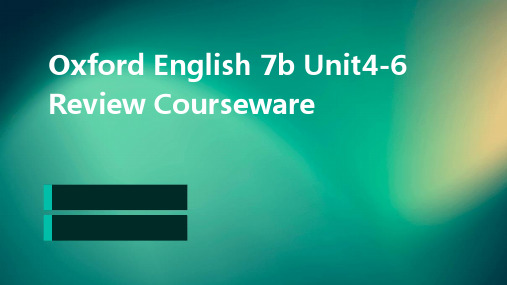
offer clear explanations for each answer, highlighting key points
and reasoning behind the answer
03 Review of Unit 6 Knowledge Points
Important words and phrases
Important words and phrases
Essential vocabulary
including but not limited to 'environment', 'pollution', 'cycle', 'preserve', 'extended'
Key phrases
such as' be harsh to ',' be responsible for ',' take action to ',' in danger of '
• Explanation of answers: providing clear explanations for the answers to help students understand where they may have gone wrong and how to improve
02 Review of Unit 5 Knowledge Points
Cross unit key and
04 diversity points sorting
Analysis and Application of Similar Phrases
牛津英语7B Unit4 Finding your way Reading 1课件

4. The birds in the zoo are very quiet. F ______ 5. Moneys are clever and funny. ______ T 6. To the north-east of the giraffes there is a hill. ______ F
They are pandas, lions, birds, monkeys, giraffes and elephants.
Read the article again and complete part B1 on Page 45.
elephant
monkeys
giraffes
birds
lions
jump around (jump ____________ monkey around, run fast) and make people _______ laugh (laugh, cry)
Animal
Features
quite _____ tall (short, tall), giraffe long _____ neck (neck, face) ______ large (large, small) ears like open ______ fans (umbrellas, fans)
lie down all day long Pandas like to eat bamboo and lie down all day long.
eat bamboo
the king of animal world
Remember they are dangerous.
make beautiful sounds Birds make beautiful sounds when they sing.
牛津英语7B_Unit4__Finding_your_way_Grammar_(2)

a monkey . It is ________
The monkey is eating an apple
It is __________ an elephant . The __________ elephant is walking .
an apple . It is ________ The apple is red.
the 1.We live on ___third floor of the tall 序数词前 building. 用于姓氏复数形式前,表示某一家人 The 2.____Whites are preparing fo 乐器前 3.My cousin ,Amy,likes playingthe ____violin. 世界上独一无二的事物 the 4.___earth goes around ____sun. The 形容词最高级前 the 5.I believe you are ____best singer . The 6.____rich should try their best to help the ____poor. 某些形容词前,表示某一类人
Notes: 1 lie on the grass 躺在草地上 lie on 躺在…上 lying是lie的现在分词形式 2 look like 看起来像… 3 in an open area 在一片开放的区域 4 in a very big cage在一个很大的笼子里 5 What can you see across it? 你能看到桥对面有什么? 6 go across the bridge 走过桥
The Smiths are having supper at home 13. ______ now.
+Unit+4+Finding+your+way+知识点汇总 牛津译林版七年级英语下册

7BUnit4 Finding your way 知识点汇总一、Comic strip and Welcome to the unit.1. follow me 跟我来【=come with me】【拓展】following 形容词:接下来的、以下的the following week = the next week 下一周2. Are you sure?你确定吗?【复习】be sure 用法:(1)be sure of/about sth. (2)be sure to do sth.(3)be sure +(that)宾从3.Let's go on a trip. 让我们去旅行。
【重点】go on a trip to sp. = travel to sp. = go to sp. for a trip 去某地旅行4.have to go up again 不得不再上去5.Sunshine Zoo is north of Sunshine Middle School.【重点】表示“A在B的东/南/西/北面"用句型:A is east/south/west/north of B其同义句是(另一种表达方式):A is to/on the east/south/west/north of BEg: Nanjing is west of Shanghai=Nanjing is to the west of Shanghai表示方位的介词in.on与to的区别:(1)in 表示A在B的范围之内,Jiangsuis in_the south ofChina.江苏在中国南部。
(2)to 表示两者不接壤,在范围以外,不是从属关系:Japanis to the east ofChina. 日本在中国东面.(3)on 表示两地接壤,在范围以外,不是从属关系:Russia is on the north ofChina. 俄罗斯在中国北面。
牛津译林英语7B Unit4 Finding your way知识点

across是介词,意为“穿过,横过;在……对面”,常用在名词或代词前面或动词后面表示移动方向;
crossing是名词,意为“十字路口”。
4. right
right用作名词,意为“右边,右方”;
right作形容词,意为“右边的,正确的,合适的”;
如果你那样做,你一定会失败。
Are you sure of the time of the meeting?
你确定开会的时间吗?
I'm not sure whether he is right or not.
我不确定他对还是错。
Check your English test paper again and make sure there is no mistake in it.
把你的英语试卷再检查一遍。以确保没有错误。
6. remember
remember常用作及物动词,意为“记住,记得”,
常用结构:remember to do sth.意为“记住要做某事”(未做)
remember doing sth.意为“记得做过某事”(做过)
remember + that从句。比如:
My home is not far away from the zoo.我家离动物园不远。
17. How will we get there?我们将怎样到达那儿?
get to意为“到达”,get there意为“到达那儿”,当后面接地点副词时,to要省略。
How can we get to the hotel?我们怎样到达旅馆?
You’d better get there by bus。你最好乘公共汽车到那儿。
牛津英语7B Unit4 单元知识点

牛津英语7B Unit4 Finding your wayComic strip1.Follow me, Eddie.跟着我,埃迪。
(教材第42页)follow 此处用作及物动词,意为“跟随”,其后可以接表示人或事物的名词或代词作宾语。
The robot follows Mr Green all the time.这个机器人一直跟着格林先生。
He followed her into the house.他跟随她走进房间。
[拓展]①follow用作动词时还可意为“仿效”。
I don't want you to follow my example.我不想让你仿效我。
①follow的形容词形式是following,意为“下述的,下列的”。
Which of the following sentences is right?下列哪个句子是正确的?2 Let's go down here.我们从这儿下去吧。
(教材第42页)down 此处用作副词,意为“下去,向下”,go down意为“向下走”,常表示位置或价格等下降。
They are going down from the top of the hill after planting trees.植树结束后,他们正从山顶往山下走。
[拓展] down还可用作介词,意为“沿着..... 。
Go down this street and you will find the hotel on your left.沿着这条街走,你会发现旅馆在你的左边。
3.Eddie,I think we have to go up again.埃迪,我认为我们得再上去。
(教材第42 页)1)辨析:have to与musthave to与must都含有“必须”之意,后都接动词原形,但用法不同,具体如下。
have to因客观上的需要而“不得不”。
有人称、数和时态的变化。
七年级英语下册 Unit 4复习学案牛津版
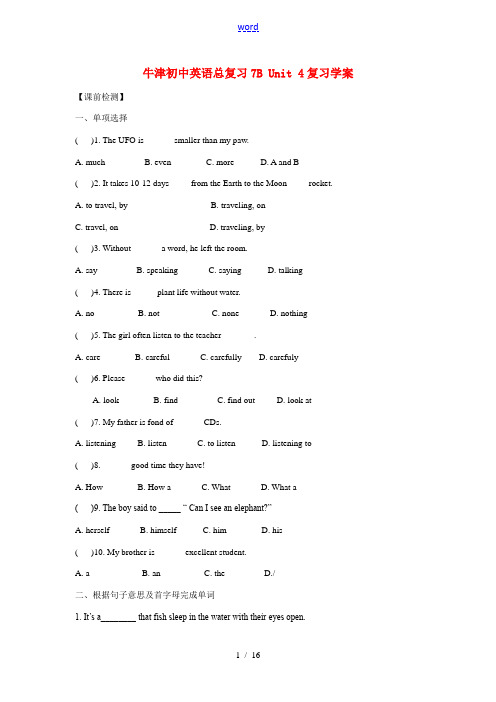
牛津初中英语总复习7B Unit 4复习学案【课前检测】一、单项选择( )1. The UFO is ______ smaller than my paw.A. muchB. evenC. moreD. A and B( )2. It takes 10-12 days ____ from the Earth to the Moon ____ rocket.A. to travel, byB. traveling, onC. travel, onD. traveling, by( )3. Without ______ a word, he left the room.A. sayB. speakingC. sayingD. talking( )4. There is _____ plant life without water.A. noB. notC. noneD. nothing( )5. The girl often listen to the teacher _______.A. careB. carefulC. carefullyD. carefuly( )6. Please ______ who did this?A. lookB. findC. find outD. look at( )7. My father is fond of ______ CDs.A. listeningB. listenC. to listenD. listening to( )8. ______ good time they have!A. HowB. How aC. WhatD. What a( )9. The boy said to _____ “ Can I see an elephant?”A. herselfB. himselfC. himD. his( )10. My brother is ______ excellent student.A. aB. anC. theD./二、根据句子意思及首字母完成单词1. It’s a________ that fish sleep in the water with their eyes open.2. He said it in a w_________, so I couldn’t hear him.3. Max has a bad cold. He is s_________ a lot today.4. Is that an English name? It sounds s_________ to me.5. Sorry, I didn’t hear you. Could you say it a_________?6. He is c_________ about English. He reads English for two hours every day.7. Mary will marry her boyfriend next month. She i_________ me to their w___________.8. Emperor Qin is the first Emperor in China’s h___________.三、根据括号里所给单词的正确形式填空1. This Maths problem is _________(easy). I can work it out _________(easy).2.This morning something was very ________(usual). When I got to school at 7:20 as ________(usual), there was nobody in the classroom. But ________(usual) there are many students in the classroom at this time.3. Most puter games are very ___________(interest). So I’m __________(interest) in them. But I think CS is __________(interest)Game of all.4. He was talking _______(many) of the time while I was listening. And after talking with him for a long time, now I think I know _________(many) about him.【精选词汇讲解】㈠重点短语1. sleep with their eyes open睁眼睡觉→介词短语with eyes open作伴随状态〈知识〉with sth+介词短语或形容词,作伴随状态。
- 1、下载文档前请自行甄别文档内容的完整性,平台不提供额外的编辑、内容补充、找答案等附加服务。
- 2、"仅部分预览"的文档,不可在线预览部分如存在完整性等问题,可反馈申请退款(可完整预览的文档不适用该条件!)。
- 3、如文档侵犯您的权益,请联系客服反馈,我们会尽快为您处理(人工客服工作时间:9:00-18:30)。
11. take care of=look after照顾、照料某人;保管某物
〈知识链接〉takegoodcare of=look after…well好好照顾某人,保管好某物
〈用法拓展〉被动语态be taБайду номын сангаасen good careof,be lookedafterwell记住:不能丢掉介词of, after
〈知识链接〉with sth+介词短语或形容词,作伴随状态。e.g. ①He sleepswith windows closed. ②Miss Yang came inwith a big smile on her face.
3. sneeze and keep your eyes open at the same time打喷嚏时睁着眼睛
8. search carefully仔细搜索
〈知识链接〉search ⑴vt.搜查;搜身,e.g. search sp搜查某地,search sb搜某人的身。注意:search for sb寻找某人。e.g. ①The policesearched his house.警察搜查他的房子。②search …for…搜查某地或某人的身来寻找… e.g. Theysearched the house for the thief. ⑵vi.搜寻;寻找search for…=look for… e.g. Shesearched for her lost key.
4. walk on tiptoe用脚尖走路→on tiptoe用脚尖,on foot步行。注意此处这两个名词不能用复数。
5. one Sunday morning一个星期天的早晨,one…在时间状语中,前面不能加介词。(p62)
6. as usual像往常一样→than usual比往常更…(这两个短语不能用usually)
(牛津初中英语总复习)7B Unit 4
一.【精选词汇】
㈠重点短语
1. a UFO一个不明飞行物, UFO全写为Unidentified Flying Object, UFO的复数为UFOs (p60)
2. sleep with their eyes open睁眼睡觉→介词短语with eyes open作伴随状态(p61)
〈知识链接〉as+形容词或副词原级+as sb can/could=as+形容词或副词原级+as possible尽某人所能…;尽可能…,e.g. ①Please speak Englishas much as you can. ②The flowers should be wateredas often as possible.
9.make a sound likea whisper=sound likea whisper听起来像低语声
10. later that day那天晚些时候→ later稍后,later on以后,latest最新的,lately最近;近来
〈知识链接〉⑴See youlater.回头见;回见⑵I’ll explain it to youlater on.待会儿我将向你说明。⑶最近;近来①lately用于否定句、疑问句中②recently用于肯定句中。lately和recently都常用于现在完成时中,e.g. I haven’t heard from himlately.
16. take photos拍照→take a photo拍照→take a photo of sb给某人拍照(p67)
17. live up to 150 years old活到150岁→live up to…活到…岁(p70)
18. smell things as well as dogs can嗅觉和狗一样灵敏→ as well as sb can和…一样好
12. the following day=the next day第二天→the following…=the next…接着的…,第二…
13. be/feel frightened of=be/feel afraid of=be scared of害怕…,后接名词、代词或动名词。
〈知识链接〉⑴a little afraid有点害怕⑵frighten vt.吓唬,Don’t frighten her. She is just a child.
〈知识链接〉keep sth+形容词,形容词作宾语补足语,e.g. keep the room clean and tidy
〈用法拓展〉形容词作宾补有:make+宾语+形容词,find+宾语+形容词,think+宾语+形容词。e.g. ①What makes you happy? ②We find English useful.
14. kick a stone or a can踢石头或罐头(p65)
15. very few很少→very little很少e.g. She dislikes bananas. She eats very few of them.
〈知识链接〉→just a few只有/只要几个,just a little只有/只要一点没有very a few, very a little
〈知识链接〉usual→usually,usual→反义词unusual,usually→反义词unusually e.g.
①This morning she got up earlyas usual. ②This morning he got up earlierthan usual.
7. hear a whisper from the bushes behind the tree听到树后灌木丛传来低语声
